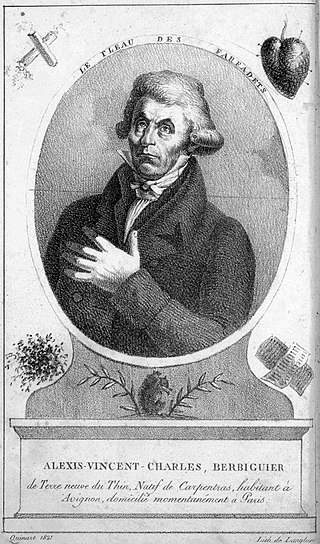Loading AI tools
French author and demonologist From Wikipedia, the free encyclopedia
Alexis-Vincent-Charles Berbiguier de Terre-Neuve du Thym or better known as M. Berbiguier (1765 – December 3, 1851) was a French author and demonologist who may have had psychosis. He was born, and died, in Carpentras in Southern France, and was the heir to an estate, which he used to finance the publication of his unusual memoirs. He is remembered chiefly for his lengthy autobiography, Les farfadets ou Tous les démons ne sont pas de l'autre monde ("The Imps; or, All the demons are not from the other world"), originally published in three volumes between 1818 and 1820. The book was handsomely illustrated by a series of lithographs whose originals were sketched by Berbiguier himself.

This article needs additional citations for verification. (September 2018) |
This autobiography recounts Berbiguier's lifelong struggle with farfadets, "imps" or "goblins". He relates that these imps harassed him persistently ever since his unfortunate encounter with two "sibyls", or fortune tellers, whom he consulted in an idle moment in his youth. For this sin, he was delivered into the hands of impish tormentors. The imps continued to follow Berbiguier through several lengthy stays in Avignon and Paris. The chief imp among his tormentors was named Rhotomago; Rhotomago's immediate superior was Beelzebub himself. He alleged that he received, and answered, written correspondence from all of these Hellish dignitaries.
By research and experiment Berbiguier determined a number of herbal and other remedies that had the power to keep the imps in check. He wrote his book, he relates, to reveal his struggles and his methods to the world. In an eloquent if presumptuous dedication, he addresses himself to:
A TOUS LES EMPEREURS, ROIS, PRINCES, SOUVERAINS DES QUATRES PARTIES DU MONDE
Sires,
Pères des peuples, qui représentez sur la terre de Dieu de Paix et de consolation, qui est dans le ciel, réunissez vos efforts aux miens pour détruire l'influence des Démons, Sorciers et Farfadets, qui désolent les malheureux habitants de vos Etats. Vous voyez à vos pieds le plus infortuné des hommes; les tourments auxquels je suis en lutte depuis plus de vingt-trois ans sont les plus beaux titres que je puisse avoir à un de vos regards paternels.
Ah ! Il y a déjà longtemps que les persécutions diaboliques des Farfadets auraient eu un terme sur la terre, si quelqu'un de vos sujets avait eu le courage de vous les dévoiler. C'est pour les démasquer que je vous dédie mon ouvrage; vous ne serez pas insensibles à mes tourments, vous les ferez cesser dès qu'ils vous seront connus.
The autobiography relates Berbiguier's struggles with the imps. He was able to capture some of them, and confine them in bottles. Sulphur and thyme were two odours he found were effective to repel them. The book tells of an adventure he had with firefighters during a sojourn in Paris, where he attracted the alarmed notice of neighbours by burning sulphur to keep the imps at bay. Notwithstanding his efforts, the imps continued to tempt and torment him. The title de Terre-Neuve du Thym was self-bestowed; it means "of the New World of Thyme," and shows his hope that revealing his methods will renew the world and purge it of impish influences. He also bestowed upon himself the style Le Fléau des Farfadets, "the Scourge of the Imps."

As a result of these activities, he eventually was committed to the Hospice de la Salpêtrière under the care of Dr Philippe Pinel, a pioneer of psychotherapy; he was eventually released. Pinel was unable to achieve much for him, and appears in the book as a servant of the imps. An ultimate improvement in Berbiguier's mental state may be indicated by a report that he attempted to round up and destroy the surviving copies of his book, which as a result are quite scarce.
Raymond Queneau and André Blavier considered Berbiguier to be a fou littéraire, a "literary madman," or rather, the literary equivalent of outsider art in France.[1] Théophile Gautier used Berbiguier as a model for his fantastic story, Onuphrius; ou les vexations fantastiques d'un admirateur d'Hoffmann, and Gustave Flaubert similarly consulted Berbiguier's work for his tale of Bouvard et Pécuchet.
Seamless Wikipedia browsing. On steroids.
Every time you click a link to Wikipedia, Wiktionary or Wikiquote in your browser's search results, it will show the modern Wikiwand interface.
Wikiwand extension is a five stars, simple, with minimum permission required to keep your browsing private, safe and transparent.